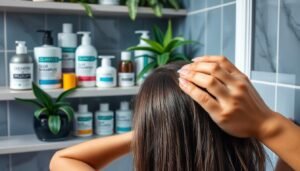Spotting a Sensitive Scalp
A sensitive scalp can be a source of frustration for many, manifesting in various ways that may interfere with your hairstyling routine. Common signs of a sensitive scalp include persistent itching, irritation, redness, and inflammation, making the scalp visibly uncomfortable to the touch. Flakiness and dandruff can also occur, often exacerbated by harsh chemicals in some hair styling products.
In addition to these symptoms, individuals with sensitive scalps may experience increased sensitivity to temperature changes, discomfort from heat or cold, and allergic reactions, such as red bumps or hives, triggered by certain hair products. Recognizing these signs early can help you take proactive steps to address your scalp’s sensitivity and choose products that minimize discomfort.

The Art of Choosing Scalp-Friendly Hair Styling Products
Selecting the right hair styling products for sensitive scalps involves several key considerations. First, choose products specifically formulated for sensitive skin, which are typically free from harsh chemicals and fragrances. Look for labels that indicate hypoallergenic or dermatologist-tested formulations.
Pay close attention to the ingredients list. Avoid common irritants like sulfates, parabens, phthalates, and synthetic fragrances. Instead, opt for natural ingredients such as aloe vera, chamomile extract, coconut oil, and shea butter, which can nourish your hair and soothe your sensitive scalp.
Additionally, select lightweight, non-greasy formulas that are easy to wash out, avoiding heavy creams or gels that may weigh down your hair or clog pores. Water-based or gel-based products provide hold without causing buildup on the scalp, keeping your hair looking its best while protecting your scalp.
Ingredients to Give the Boot
When choosing hair styling products, it’s crucial to avoid certain harsh ingredients that can irritate sensitive scalps. Sodium lauryl sulfate (SLS) and sodium laureth sulfate (SLES) are notorious for stripping the scalp of its natural oils, leading to dryness and irritation. Opt for sulfate-free products to prevent aggravating sensitivity.
Alcohol is another common ingredient that can be detrimental to sensitive scalps. While it may provide temporary benefits like quick drying, it often leads to long-term dryness and irritation. Look for alcohol-free alternatives that hydrate without compromising scalp health.
Synthetic fragrances, often added for scent, can also trigger allergic reactions. Choosing fragrance-free or naturally scented products can help reduce the risk of irritation while still providing a pleasant grooming experience.
VITAMAN’s Top Picks for Sensitive Scalp Styling
For those with sensitive scalps, VITAMAN offers a range of exceptional hair styling products prioritizing both effectiveness and scalp health. Their Gentle Scalp Shampoo, formulated with soothing botanical extracts like aloe vera and chamomile, cleanses without stripping essential oils, making it perfect for sensitivities.
Their Nourishing Hair Conditioner, enriched with jojoba oil and shea butter, hydrates and strengthens hair while soothing the scalp. This lightweight formula absorbs quickly, leaving soft, manageable locks.
For styling, VITAMAN’s Sculpting Gel is an excellent option. This alcohol-free gel provides strong hold without causing irritation or flaking, infused with nourishing plant extracts like ginseng and green tea for added scalp care.

Extra Tips for a Happy Scalp
Incorporating a few extra tips into your hair care routine can significantly promote scalp health.
- Washing Frequency: For sensitive scalps, washing every 2-3 days with a gentle, sulfate-free shampoo helps remove dirt and product build-up without stripping natural oils.
- Scalp Massages: Regular massages stimulate blood flow to hair follicles, promoting healthy growth. Adding a few drops of essential oils like lavender can enhance the experience and benefits.
- Environmental Protection: Protect your scalp from UV rays by wearing a hat or using sunscreen, and avoid excessive heat styling. Opt for protective hairstyles that minimize tension on the scalp.
By adopting these practices, you can maintain a balanced and happy scalp, laying the foundation for strong, beautiful hair.
FAQs – Your Burning Questions Answered
What are the common signs of a sensitive scalp?
Common indicators include persistent itching, redness, flakiness, and tenderness. Pay attention to your scalp’s reactions to various products to identify any triggers.
How can I determine if a hair styling product is suitable for my sensitive scalp?
Scrutinize the ingredients list for harsh chemicals like sulfates and parabens. Look for hypoallergenic or dermatologist-tested products and conduct patch tests before full application.
Are there any natural remedies or DIY solutions for soothing a sensitive scalp?
Natural remedies like aloe vera gel and coconut oil can provide relief. Essential oils like lavender or tea tree oil may also promote scalp health, but use them cautiously to find what works best for you.
Conclusion
Caring for a sensitive scalp while achieving your desired hairstyle is not only possible but rewarding. By understanding your scalp’s unique needs and choosing gentle, scalp-friendly products, you can maintain a healthy environment for your hair.
Opt for soothing, natural ingredients that nourish your sensitive scalp without causing irritation. With the right approach, you can enjoy beautifully styled hair while prioritizing your scalp health. Embrace the journey of finding the perfect products as an opportunity for self-care, allowing you to feel refreshed and confident every day.